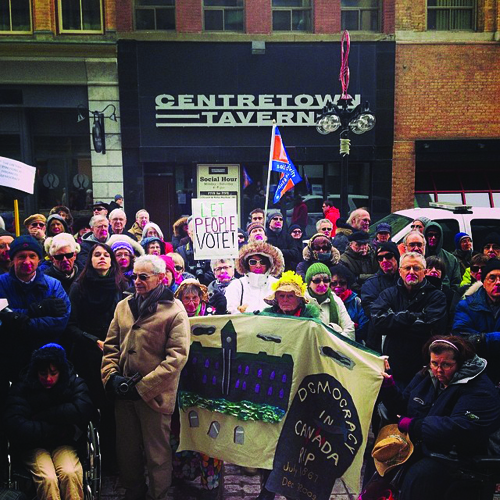The Fair Elections Act (Bill C-23), the Act to amend the Canada Elections Act, which has seen significant public outcry, has passed, but still must receive Senate approval.
More than 150 scholars at Canadian universities signed an open letter to the prime minister on the bill, claiming it damages principles of Canadian democracy.
Many argue the new laws will make voting harder for marginalized groups through different restrictions, such as acceptable identification for voting, as the traditional voucher system will no longer be accepted.
Students and executives at the York Federation of Students have already been engaged in campaigns to address the many problems with the Fair Elections Act.
Even though the bill has passed through the House of Commons, it still requires Senate approval before it becomes law.
Jessica McCormick, national chairperson at the Canadian Federation of Students who has helped spearhead letpeoplevote.ca, says the bill eliminates the ability for voters who do not have proof of address to be vouched for by another elector.
[su_quote]“This particular change would disproportionately impact students and young voters because vouching is often used by voters from these demographics,” says McCormick.[/su_quote]
“Students move frequently and it can often be difficult to keep an updated proof of address for the riding you wish to vote in.”
Additionally, the bill would place the onus on political parties to engage youth and encourage youth voter turnout, according to McCormick.
Previously, Elections Canada has implemented campaigns to address this issue. However, Bill C-23 would limit Elections Canada’s ability to do this work.
“Relying on political parties to engage youth isn’t very promising given that political parties have often ignored students’ interests and concerns, especially during elections,” she says.
New amendments have been added to the bill, as a result of the outrage expressed by the CFS, citizens, and other groups.
The amendments include an alternative to vouching, allowing a voter without proof of address to sign a declaration and have it co-signed by another voter in their riding.
In April, the YFS took part in a rally at Dundas Square in coalition with the Canadian Federation of Students-Ontario and the Council of Canadians.
According to Gayle McFadden, YFS vice-president campaigns and advocacy, the bill will further decline voter turnout, in particular the youth voter turnout.
[su_quote]“Canada has one of the lowest youth voter turnouts in the world,” says McFadden.[/su_quote]
“There is nothing in the Fair Elections Act that encourages young people to vote. Instead it makes it more difficult by complicating the voter identification process and eliminating public awareness campaigns.”
Bill C-23 will get rid of Voter Information Cards, which are used by students living away from home, among other marginalized groups, who vote without traditional means of recognized identification such as a driver’s licence or provincial photo card.
According to Elections Canada, over 120,000 voters needed to be vouched for in the 2011 election.
The bill will also cancel voter education and engagement pro- grams such as Student Vote.
[su_quote]The YFS wrote on their Facebook page that if the bill is passed, US-style voter suppression will be imposed on Canadians, “clearly targeting youth and students, poor people, seniors, aboriginal people and other marginalized groups.”[/su_quote]
There have been amendments to the bill since the demonstration in April, however, and there may be more as it goes through the legislative process.
Many are concerned the bill goes far beyond the scope of what is needed.
“Bill C-23 hampers the education of students and other Canadians about responsible citizenship and the fundamentals of Canadian democracy,” states the Canadian Teachers’ Federation.
According to McCormick, the federal government should be working to increase youth voter turnout and reduce the barriers to voting rather than creating more barriers.
“While international students are unable to vote in Canadian elections unless they gain citizen- ship, Bill C-23 could impact them with respect to the provisions in the bill that limit Elections Canada’s ability to do outreach, engagement, and education,” says McCormick.
Students who are concerned or agree with the bill can still contact their senators.
Ryan Moore
Assistant News Editor
Image source: Canadian Federation of Students
Fair Elections Act to complicate voting process




